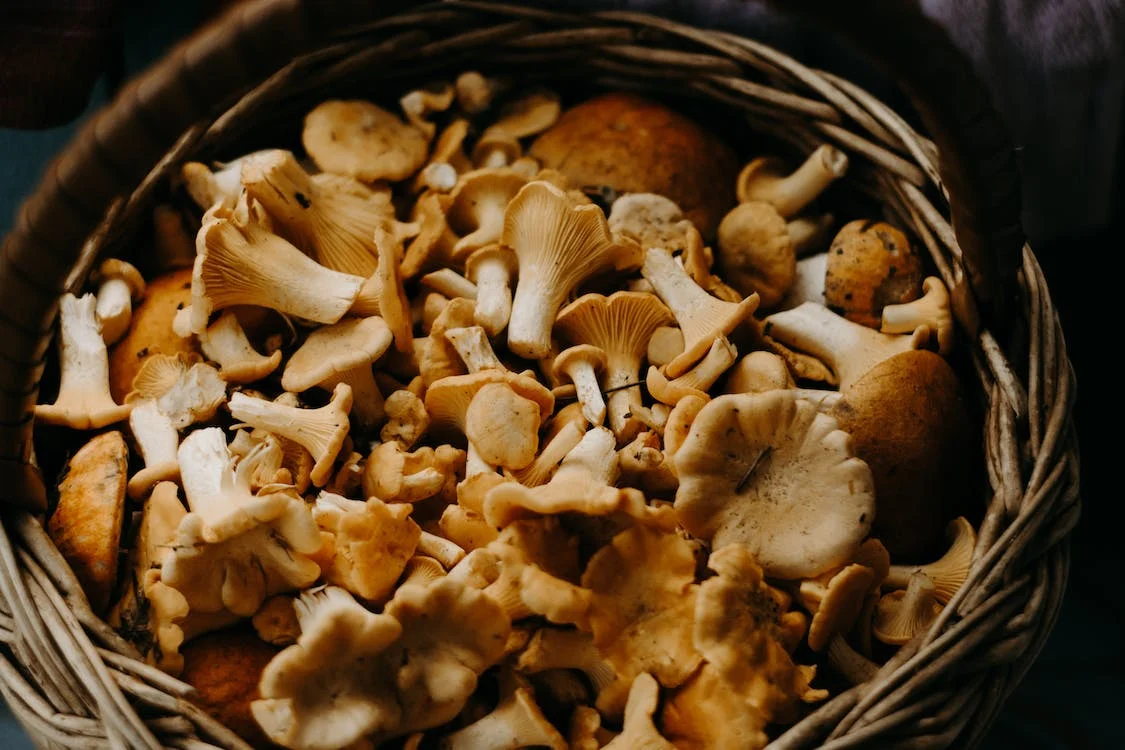What you need to know to stay healthy during the mushroom season?
Everyone knows how beautiful mushrooms are in a roast or soup, and how good they are in a jar with pickles. They are tasty and hearty! But what are mushrooms good for? And are they useful at all?
The benefits of mushrooms
Mushrooms are called the ‘medicine’ of the third millennium, and Katy Perry, singer, actress and UN Goodwill Ambassador is rumored to have lost a lot of weight on her M-Plan (Mushroom Plan) diet, which consists almost entirely of mushrooms. So what do we need to know about the benefits of these organisms?
Mushrooms contain many health benefits
The main benefit of mushrooms lies in their balanced composition – they contain almost all the microelements the body needs: 18 amino acids, organic and fatty acids, vitamins (A, B, PP, E and D). Due to this sensational set of benefits mushrooms have a beneficial effect on the nervous system, make the skin healthy, improve the condition of nails and hair, affect the cardiovascular system, metabolism, hormone production, improve immunity, and enhance the production of melanin in the skin.
Speaking of immunity. In 2012, an experiment was conducted in which 24 volunteers took part. They were asked to stick to an ordinary diet, but to add 100g of blanched white mushrooms a day to see if their SIgA (secretory immunoglobulin A) levels in saliva – the ‘first line’ of defence of the immune system – would rise over the week. In the experiment, SIgA levels increased by more than 50% within 2 weeks. So it was proven that mushrooms do improve immunity.
Mushrooms are good for diabetes
Special attention should be paid to chanterelles (before the season ends), they are a natural antibiotic and useful for diabetes, rich in vitamin A, B, selenium and zinc. In addition, almost all mushrooms contain slow carbohydrates, which lower blood sugar levels.
Mushrooms contain ‘trendy’ vitamin D
Everyone’s been obsessed with vitamin D over the past couple of years. Chanterelles and milk mushrooms are the only vegetable source of this vitamin. It boosts the body’s immune system, has beneficial effects on the intestines, kidneys (even helps in the prevention of kidney stones) and muscles, and improves heart function. And vitamin D also boosts your mood and gives you energy, so don’t be surprised when your friends ask why you always have a good morning.
Mushrooms can fight colds
The same milk mushrooms are rich in “antibiotic-like” substances that help strengthen the mucous membranes of the bronchi and lungs. So help yourself to a couple of tins of milk mushrooms in time for the cold season – they’ll help you get through this time without a single sneeze.
Mushrooms help your heart to function properly
Porcini mushrooms are good for your heart – they’re full of nicotinic acid, so you’ve probably heard of nutritionists telling heart patients to eat a soup of fresh porcini to help strengthen the walls of the myocardium.
Mushrooms give you strength
B vitamins (in oyster mushrooms and porcini it’s B2 and B3) are responsible for keeping energy levels up, so after a porcini risotto you’ll be ready to rock.
Mushrooms keep weight off
Under certain conditions, of course. If you decide to plop on a plate of roasted mushrooms and then polish off with a cake for dessert, it’s unlikely you’ll notice the benefits. But mushrooms themselves are rich in protein and virtually calorie-free. You’ll feel full for a long time and get the right dose of nutrients, while consuming very few calories.
The dangers of mushrooms
We advise you to read this point more carefully, because you can encounter some serious problems if you consume mushrooms improperly. And we’re not talking about fly agaric mushrooms or toadstools, but those mushrooms that we all eat without thinking about it.
mushrooms can contribute to the development of cancer
Research on the subject is still ongoing, and there is already strong evidence that mushrooms contribute to the prevention of breast cancer, however, in raw form they can have quite the opposite effect. The fact is that raw mushrooms contain agaritin and an enzyme that helps to break down this toxin. And the substance produced by this reaction has been classified by the International Agency for Research on Cancer as a group 3 carcinogen (not very toxic) and a genotoxic substance that affects DNA. However, all these findings need further confirmation, so do not panic.
Mushrooms can cause food poisoning.
This is not uncommon, especially if you are not an experienced mushroom picker and cannot distinguish between chanterelles and chanterelles. Try to pick mushrooms only if you are 100% sure about them.
Mushrooms cause gastrointestinal illnesses
Mushrooms contain protein called chitin, which is badly digested (or rather not digested at all) by our digestive system, and this can lead to gastritis or other problems. In order to compensate for this deficiency, it is better to eat mushrooms with lettuce, which contains fiber, which will help break down the protein.
Mushrooms absorb harmful substances.
Remember the phrase from your school biology class: ‘mushrooms are sponges’? It’s true that mushrooms do suck up all substances (both beneficial and harmful) from the air and soil, so you never know which toxins and even heavy metals will end up in their composition. Never pick mushrooms along roads and highways (and don’t buy them there).
Mushrooms don’t like the heat
By the way, our hot summer was great for sun tanning, but bad for the mushrooms near Moscow. In such a situation, even the most edible mushrooms may turn out to be toxic, all the more so if they grow in a fire-prone area or in an insect and pesticide-treated area.
Mushrooms migrate
Global warming has not been good for mushroom populations in general – thanks to warmer temperatures, poisonous mushrooms have started to grow in our latitudes that were not here before. We have a couple of new species of fly agarics (from the south and center of Europe) – “close” and “ovoid”. And one of them literally destroys buds, while the other is consumed as a delicacy. Try to guess which one? (The ‘egg-shaped’ one is a delicacy.)
How to eat mushrooms properly
In order to protect yourself when choosing and cooking mushrooms, the Rospotrebnadzor has issued a special memo, and we have added a few points of our own to it.
- Before cooking mushrooms, boil them for 10 minutes to get the maximum amount of toxic substances out of them. Afterwards, cook them as usual.
- Do not eat porcini mushrooms with meat and potatoes, as the protein contained in the mushrooms can come into conflict with meat protein, and the starch in potatoes slows down digestion.
- Forget about mushrooms if you have pancreatitis, this food requires too much effort to digest. Your body may not be able to cope with it.
- Cook mushrooms as soon as you buy them, as any protein spoils quickly.
- Do not give mushrooms to children under 6-7 years old.
- Do not store mushrooms near strong-smelling foods as they quickly absorb odorsА and can spoil more quickly next to fruit.

